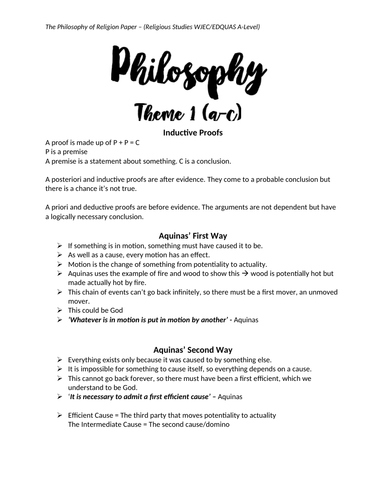
Full set (6 pages) of revision notes on both inductive and deductive proofs, covered in theme 1 (a-c) and theme 1 (d-f) of the WJEC/EDQUAS Religious Studies A-Level specification. These notes are necessary for component 2, the Philosophy of Religion paper. I have ensured they contain sufficient depth of knowledge to fulfill both A01 and A02 elements of questions.
CONTAINS NOTES ON
Inductive arguments – cosmological:
Inductive proofs; the concept of ‘a posteriori’.
Cosmological argument: St Thomas Aquinas’ first Three Ways - (motion or change; cause and
effect; contingency and necessity).
The Kalam cosmological argument with reference to William Lane Craig (rejection of actual
infinities and concept of personal creator).
Inductive arguments – teleological:
St Thomas Aquinas’ Fifth Way - concept of governance; archer and arrow analogy.
William Paley’s watchmaker - analogy of complex design.
F. R. Tennant’s anthropic and aesthetic arguments - the universe specifically designed for
intelligent human life.
Challenges to inductive arguments:
David Hume - empirical objections and critique of causes (cosmological).
David Hume - problems with analogies; rejection of traditional theistic claims: designer not
necessarily God of classical theism; apprentice god; plurality of gods; absent god (teleological).
Alternative scientific explanations including Big Bang theory and Charles Darwin’s theory of
evolution by natural selection.
Deductive arguments - origins of the ontological argument
Deductive proofs; the concept of ‘a priori’.
St Anselm - God as the greatest possible being (Proslogion 2).
St Anselm - God has necessary existence (Proslogion 3).
Deductive arguments - developments of the ontological argument:
Rene Descartes - concept of God as supremely perfect being; analogies of triangles and
mountains/valleys.
Norman Malcolm - God as unlimited being: God’s existence as necessary rather than just
possible.
Challenges to the ontological argument:
Gaunilo, his reply to St Anselm; his rejection of the idea of a greatest possible being that can be
thought of as having separate existence outside of our minds; his analogy of the idea of the
greatest island as a ridicule of St Anselm’s logic.
Immanuel Kant’s objection - existence is not a determining predicate: it cannot be a property that
an object can either possess or lack.
Something went wrong, please try again later.
This resource hasn't been reviewed yet
To ensure quality for our reviews, only customers who have purchased this resource can review it
Report this resourceto let us know if it violates our terms and conditions.
Our customer service team will review your report and will be in touch.
